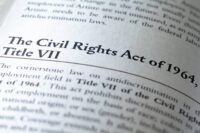Striking a Balance: Insights From EEOC, DOJ Guidance on DEI and Title VII
On March 19, 2025, the U.S. Equal Employment Opportunity Commission (EEOC) and the Department of Justice (DOJ) issued guidance clarifying how diversity, equity, and inclusion (DEI) initiatives intersect with Title VII of the Civil Rights Act of 1964. The guidance provides critical direction for employers seeking to implement inclusive workplace policies while ensuring compliance with […]













